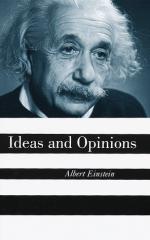|
This section contains 194 words (approx. 1 page at 400 words per page) |

|
Part 1, pp. 1-28 Summary and Analysis
Einstein is a careful if not comprehensive thinker in the humanities, modest about his fame but happy to share his views. "Paradise Lost" (1919) begins a recurring theme: European intellectuals lose when supporting nationalist regimes. "My First Impressions of the U.S.A." and "Reply to the Women of America" reflect a 1921 trip in which Einstein is struck by American technology, organization, and joyous, optimistic attitude to life.
In "The World as I See It", he puts forth his various opinions and thoughts, ranging from his understanding of the human condition, to God, and to his political ideals. "To the Schoolchildren of Japan" reflects on a 1922 visit, and his hopes that they will avoid his generation's mistakes, although this is crushed by World War II. Finally, "Message in the Time-Capsule", reflecting on the 1939 World's Fair, facetiously hopes future...
(read more from the Part 1, pp. 1-28 Summary)
|
This section contains 194 words (approx. 1 page at 400 words per page) |

|




